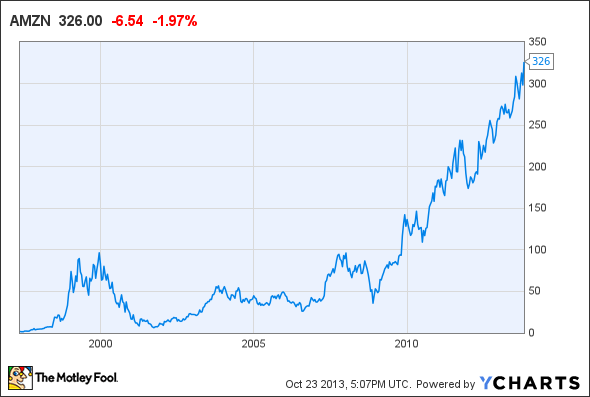When Amazon Breaks the Stock Market Scale
In this year's letter to shareholders, Amazon.com CEO Jeff Bezos writes:
...as I frequently quote famed investor Benjamin Graham ... "In the short run, the market is a voting machine but in the long run, it is a weighing machine." ... We want to be weighed, and we're always working to build a heavier company.
With this analogy, there are times when the market's scale could add some pounds that Amazon lacks -- that is, the stock could be overvalued. But looking at history, Amazon constantly ends up weighing more than what the market believes, and then outperforms in its weight class.
So, what about now? It would be crazy to think this trend of outperformance will keep going for a $150 billion company that reports losses instead of profits, right? Here are some reasons to the contrary.
Market opportunity
Amazon, of course, began selling books. Now it enters any industry it deems lucrative. Even though it operates in a breadth of industries from Web services to publishing to video entertainment, and it seems like there aren't many more industries to take on, it can still grow through depth. To Amazon, it's all about the customer experience, and giving incentives and features that will attract new customers and keep old ones. If this strategy proves effective, it could grow its share in any of its many businesses.
Take retail sales as an example. Only about 8% of U.S. retail sales happen online. And, Amazon accounts for only 15% of this 8%. Not all retail will happen online in the future, but it seems there is still plenty of the market that online retail, and Amazon, can gobble up. And this is especially true as one of the largest negatives of ordering online -- having to wait for the thing to ship -- is negated with same-day shipping.
Or take its Web service business. At the end of last year, it was estimated to have a 36% share in the infrastructure-as-a-service market, and 18% share in the platform-as-a-service market, and both of these markets are only 15% of the total infrastructure service market. As cliche as it has become, the "cloud" is where everything is headed.
And let's not discuss rumors of the upcoming Amazon phone.
The past is no guarantee
Looking at Amazon's stock price over its life, there was never a bad time to buy:
Even at the peak of the dot-com era, and even right before the Great Recession, an investment in Amazon always beat the market. That means nothing for the future, but it's a sign that the market inherently undervalues Amazon's potential. Jeff Bezos still leads the company, and the approach to business has never changed. Betting on a huge company to become bigger while it runs a highly fragmented line of businesses could be a dangerous proposition, but for as dominant as Amazon seems today, it can become even more pervasive.
Or, in terms of Bezos' and Graham's weight analogy, Amazon has only finished its appetizer at the all-you-can-eat buffet, while the market thinks that it's already on dessert.
Amazon won't be the only one to rule retail
The retail space is in the midst of the biggest paradigm shift since mail order took off at the turn of last century. Only those most forward-looking and capable companies will survive, and they'll handsomely reward those investors who understand the landscape. You can read about the 3 Companies Ready to Rule Retail in The Motley Fool's special report. Uncovering these top picks is free today; just click here to read more.
The article When Amazon Breaks the Stock Market Scale originally appeared on Fool.com.
Fool contributor Dan Newman has no position in any stocks mentioned. The Motley Fool recommends Amazon.com. The Motley Fool owns shares of Amazon.com. Try any of our Foolish newsletter services free for 30 days. We Fools may not all hold the same opinions, but we all believe that considering a diverse range of insights makes us better investors. The Motley Fool has a disclosure policy.
Copyright © 1995 - 2013 The Motley Fool, LLC. All rights reserved. The Motley Fool has a disclosure policy.


